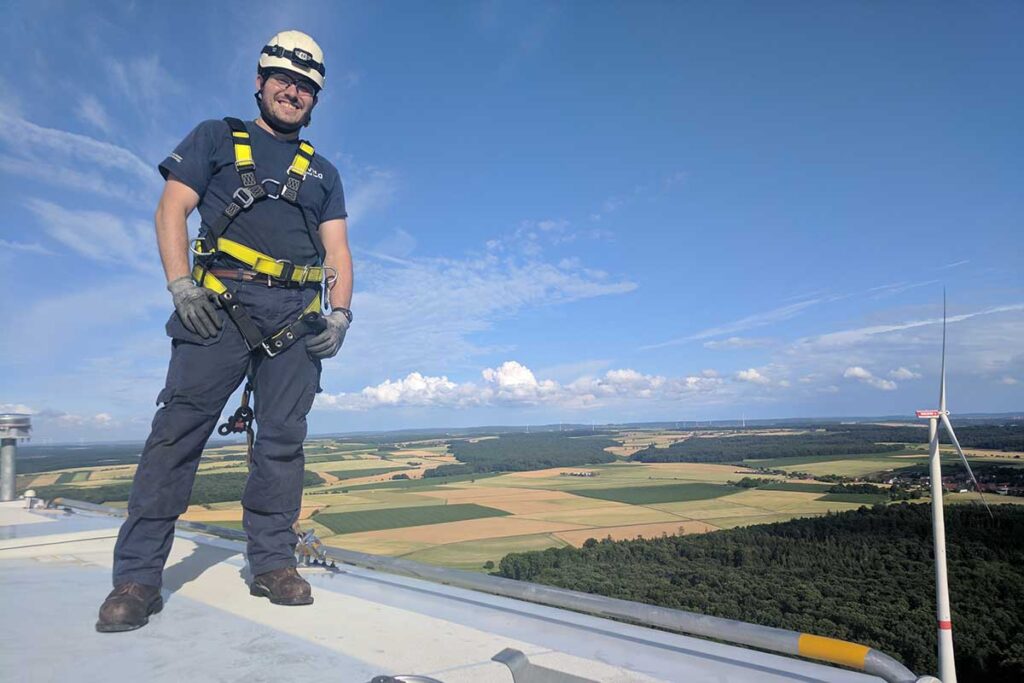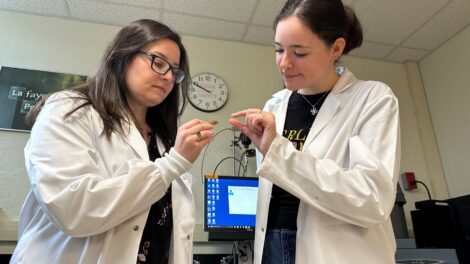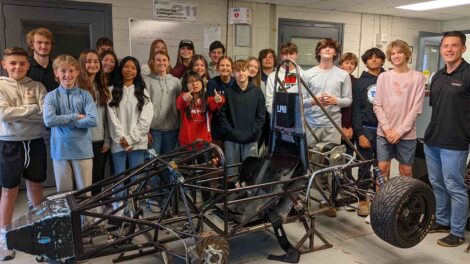Engineering success story: Kevin Eherts ’14
Kevin Eherts ’14 is the technical lead for wind turbine repair deployment at GE Renewable Energy. As part of the global technical operations team, Eherts works with engineers to develop and implement tools and processes for installing and repairing onshore wind turbines, as well as training new regions on repair capabilities. He earned a chemical engineering/international studies dual degree from Lafayette College.

Kevin Eherts ’14 is the technical lead for wind turbine repair deployment at GE Renewable Energy
What do you love about the work that you do? How does it feel to make such a positive impact on the environment?
I love that I am in a true cross-functional position that gets to see all aspects of the business, work on a team and with an engineering group with whom I enjoy spending time, and be hands-on around the world to solve problems that have a material impact in the industry and in the effort to combat climate change. Few things are as satisfactory as implementing a new technology that brings a wind turbine back online sooner and saves approximately 1,000 homes’ worth of electricity-related carbon emissions.
What sparked your interest in sustainability? Was this something you always wanted to do?
While I always had an interest in renewable energy and sustainability, I came to Lafayette and went for chemical engineering with the intention of becoming a brewer! It wasn’t until senior year when I faced the reality of trying to land an entry-level position at a large brewery that I began to seriously consider looking at other industries. Right around that time, Jessica Cohn ’04—who worked at GE Renewable Energy at the time—reached out to Prof. Lauren Anderson to ask for candidates for GE’s Renewable Energy Development Program (REDP). I jumped at the opportunity, and thankfully they accepted a chemical engineering major into their mechanical engineering world!
My first rotation was on our digital product line team, working on optimizing site operations and maintenance work. While that was not at all what I was expecting I would be doing as an entry-level engineer, it was an awesome introduction to the wind services and operations world, and I was able to learn from many internal teams and external customers. Once I went for my first site visit and then later spent a few weeks performing hands-on work 100+ meters in the sky, I was sold.
Now, I get to work on different technologies with varying engineering groups, suppliers, and regions having been promoted to the technical lead position. As a technical group outside of engineering, and with the rapid growth of the industry and near-yearly introduction of new wind turbine platforms between 2016 and 2021, we are always kept plenty busy and never quite know what problems we will be solving the next year.
Were there any professors, courses, or experiences that were particularly influential to you during your time at Lafayette and that continue to impact your work today?
My Lafayette education was a great blend of learning about foundational technical principles, how to deep-dive into a subject, and how to communicate. I will always appreciate how Prof. Michael Senra prepared me for the weekly cold calls I now get from technicians with an urgent problem they need me to solve. The environment of camaraderie and working together to solve difficult problems that he fostered with his students also is something I share with my current team at GE. Prof. Polly Piergiovanni’s guidance on how to scope an independent study in biochemical engineering—combined with how she incorporated student-led subjects—has clearly translated in both my confidence in self-sufficiency and in my working toward mutual goals with engineers and product owners, who have their own interests and priorities.
As somebody working in an out-of-degree industry, knowing the basics of mechanical engineering was crucial to being able to immediately jump in on and contribute to technical programs. Within my team, I have been given some freedom to explore and own issues important to operations that haven’t yet reached priority on the engineering docket. Through the research and reporting from classwork at Lafayette, learning how to dig in to define, understand, and present on a topic also has been an incredibly useful skill.
How did your other experiences at Lafayette help lay the foundation for your career?
Getting comfortable and falling in love with travel through study abroad in Madrid and an interim trip to Peru, taking courses in three different foreign languages that happened to coincide with where our engineering teams have offices, and working with people from varying countries and backgrounds have made the global aspect of working at GE a true enjoyment. My leadership positions on the rugby team and in the Delta Upsilon chapter at Lafayette also taught me how to make decisions and lead when there is no ‘playbook’ written for you. It was great experience to take into my role in a new and growing industry.
What are your goals for the future?
Professionally, I have loved growing in-role to become a domain expert and reliable co-worker in an otherwise ever-changing organization. I hope to continue to push forward safety and efficiency in the wind turbine installation and servicing industry while working with great people and getting to see the world. By doing so, I know that every day a turbine is online sooner, and every efficiency we can gain for the customer and end-user is a contribution toward combating climate change. Personally, I look forward to getting married this fall and continuing to advocate for animal rights through veganism.
What kind of advice can you offer to current engineering students about how to apply what they’re learning to their future careers?
Practice explaining what you are learning, researching, or working on to folks outside of your class in a way that helps them understand and connect with the topics. Being able to clearly communicate on something with a lot of nuance and complexity will make work more rewarding and help get you the support and resources you need to succeed in solving problems.

